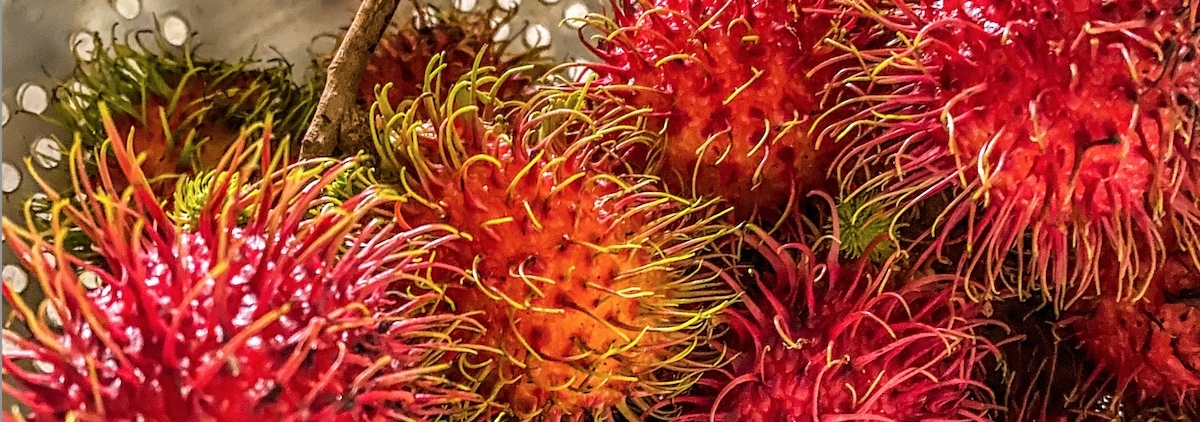Photo by Beth Macdonald.
This morning, the Balcony Gardener sat cross-legged on her folding chair, sipping garlic scape tea from a chipped porcelain cup that once belonged to someone else’s grandmother. The tea had a grassy bite that suited her; it curled through her sinuses and made her feel awake in the way certain small green things can.
Before her stood her tomato plants—vigorous, unapologetic, brushing against the rusted iron railing like they had somewhere important to be. The fruit was still green, but she could see a blush forming, unmistakably plump and promising. She admired it with a quiet pride that bordered on affection.
Her Golden Hami melon had made a valiant showing. Against all practical logic, she’d devoted one of her precious balcony corners to the plant, even though she could only manage room for two. The other melon vine had begun to twine itself around the leg of the table, as if attempting escape.
From time to time, as she sipped her pungent tea, the gardener let her thoughts drift westward. California. The old garden.”
The herbs were rampant this year. Basil had gone slightly mad. The tarragon had elbowed out the thyme. Mint had colonized its pot and was threatening to leap across species. She had half a mind to let it.
From time to time, as she sipped her pungent tea, the gardener let her thoughts drift westward. California. The old garden. Rows of vegetables grown with the easy confidence of long summers and deep soil. Zucchini so generous they needed taming. Corn that whispered in the dusk. Luscious strawberries and even some grapes.
She missed it—not painfully, but with a soft nostalgia, like one might miss a coat left behind in a warm room. That was then. Now, there were two melon plants, herbs in mutiny, and tomatoes straining toward the Parisian sun. She was content. Summer had a way of calming her.
And then there was Madame Dupont—her “interesting” neighbor.
It began with a box. A small brown package marked Périssable arrived one morning with no return address and an air of urgent mystery. Inside: a single, spiky, unapologetically tropical rambutan. The Balcony Gardener poked it with a spoon. It did not react.
Madame Dupont, who had a nose for the unusual and a gift for arriving just as things got interesting, appeared moments later.
“Ah! A rambutan,” she declared. “I haven’t seen one since 1982. Or possibly in Brussels. Something beginning with B.”
They sliced it open with reverence. Inside was a trembling, pearlescent fruit the size of a marble and with the charisma of a minor deity. They shared it over weak tea and stale biscuits, and the Balcony Gardener was instantly obsessed.
What mattered was that they had entered a new era: the rambutan era.”
The mystery was solved a week later when Madame Dupont’s nephew—a soft-spoken man with owl eyes and a habit of humming Debussy—arrived with a netted pouch of the same exotic fruit. He had just returned from Réunion Island and thought they might appreciate the surprise.
And they did. Oh, how they did.
The very next day, the two women set out for the Marché Bastille, armed with tote bags and culinary ambition. The vendor, a man in fingerless gloves who smelled faintly of cloves and carried the weight of philosophical sorrow, offered them rambutans “in season, but not for long.”
They bought three kilos. Possibly four. The weight didn’t matter. What mattered was that they had entered a new era: the rambutan era.
Back on the balcony, they ate the fruits like teenagers at a sleepover. Juice ran down their wrists. Rinds flew. Teddy the poodle supervised with increasing concern.
By the fifth rambutan, the Balcony Gardener had developed a magnificent case of hiccups. Madame Dupont attempted several cures—none of them medical, most of them theatrical—including turning her upside down, demanding vinegar, and a dramatic recitation of the French national anthem backward.
Eventually, the hiccups passed, and a companionable silence settled over the balcony. The rambutan shells lay like spiny relics of a small, exquisite war.
“You know,” said the Balcony Gardener, “I never grew fruit like this in California.”
“No,” said Madame Dupont. “But you never had me to eat it with, either.”
Teddy sighed.
Some fruits you plant. Some, you chase. And some arrive with no explanation, asking only to be eaten in good company.”
By evening, they had decided to preserve what remained. They made syrup with lime and a whisper of cardamom. They sterilized jars with military precision. Madame Dupont produced a preserving manual last seen during the Cold War and insisted they label each jar in her finest calligraphy: Ramboutan de Guerre.
The jars lined the balcony like glistening trophies. The hallway smelled faintly of sugar and colonial mischief.
The Balcony Gardener looked around at her once-modest balcony, now teetering between Parisian charm and tropical absurdity. Amid the herbs and tomatoes, a lemongrass cutting had begun to lean toward the light, almost—almost—hopeful.
“Better than plums,” Madame Dupont said, patting her belly.
“Plums don’t arrive in the mail and threaten your worldview,” replied the Gardener.
And so, the rambutan affair continued. Not a habit, but a ritual. Not a necessity, but a delight. Some fruits you plant. Some, you chase. And some arrive with no explanation, asking only to be eaten in good company.
They agreed to return to the market the following week. There were jars to fill. Hiccups to risk. And, possibly, a lemon tree to smuggle up the stairs.
Editor’s Note: Read more of the Parisienne horticulturist’s adventures in The Balcony Gardener Volume 1.
